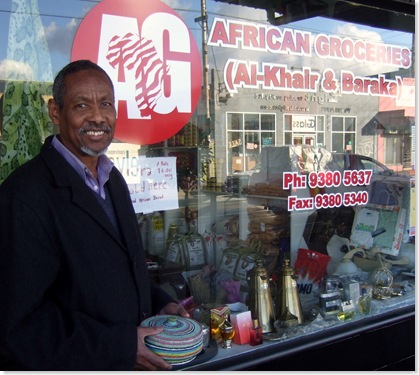Within the liberal classes, we have become so used to our own sense of tolerance and cosmopolitanism, we may be blind to the danger of complacent insularity from within.
The People's Republic of Brunswick is a widely celebrated bastion of multiculturalism. After Italian, Greek and Arab, the latest region to add its culture to the suburb's diversity is African. In Lygon Street is the new store with goods and crafts from east Africa. Mahmoud Leman is here holding a bowl made by local Eritreans from recycled materials. His wife Halima Sheikhdin has been particularly involved in this activity.
I visited this store on my way to a 'town hall' meeting at the East Brunswick Hotel where a panel was discussing the latest plan for development in Brunswick. The hotel was packed to the gills with locals keenly interested to ensure that their suburb was protected from threats from outside. One of the proposals considered was a ring road to direct cars away from Brunswick.
Looking around at the crowd, it was hard to find anyone - including myself - who was not Anglo middle class. There were no Greeks or Africans present. While seeming noble in motive, reflecting a shared consensus in 'green' values, I couldn't repress a feeling of apprehension that this is a kind of middle class gentility whose hidden purpose is to ensure homogeneity. It's a terrible thought, which I attribute to some devil whispering in my ear. But I await the voice of the angel to dispute this.
And last night, I went to the surprise lecture of the next director of the Sydney Biennale, David Elliot. While celebrating 'impurity' in art, he actually contextualised this within the consciousness of the artist, rather than a critical engagement with impurity as we have seen in psychoanalysis or postcolonialism. The sense was that the free bohemian artist was above the crude divisions that exist in the world. This disengagement of art from the world (suggested partly in this year's Biennale) does not bode well for responses to climate change. Will re-localisation prove to create comfort zones for well-endowed elites?
Well, someone has to ask the question, if only to be proved wrong.

No comments:
Post a Comment